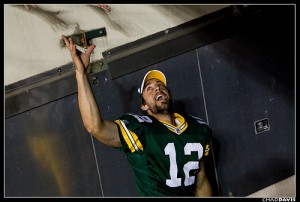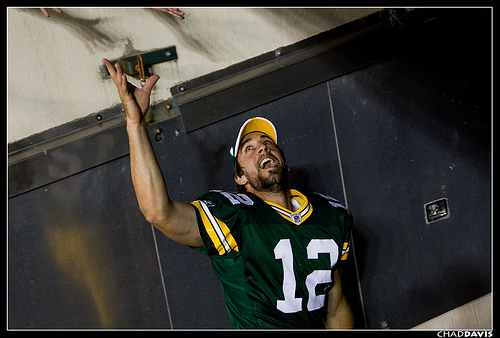By Trevor Fik (Staff Writer) – Email
 In the end, it was the 24th pick overall in the 2005 NFL draft that brought the Lombardi trophy back to Green Bay, not the future Hall of Fame quarterback that spent 16 seasons with the squad.
In the end, it was the 24th pick overall in the 2005 NFL draft that brought the Lombardi trophy back to Green Bay, not the future Hall of Fame quarterback that spent 16 seasons with the squad.
Despite riding the bench for three seasons as backup, and not seeing any real playing time until 2008, it only took Aaron Rodgers three seasons to lead the Packers to the Super Bowl. While being far from perfect with several errant throws and less than stellar accuracy, Rodgers threw for 304 yards and three touchdowns in the Packers 31-25 victory over the Pittsburgh Steelers.
Rodgers remained calm in the pocket throughout the game, seeing five or more pass rushers in over half of the Steelers defensive formations. With key injuries to Donald Driver and defensive standout Charles Woodson occurring early for the Packers, the team managed to pull it together long enough to put up some big plays and end the Steelers’ playoff drive.
While the Steelers played with their usual toughness, it was a few costly errors that inevitably swung the game in the favour of the Packers. Two big time interceptions by Steelers’ quarterback Ben Roethlesberger and a missed opportunity on a fumbled punt return by the Pittsburgh special teams allowed the Packers to get ahead early in the game. The Packers scored two touchdowns within 30 seconds of one another in the first quarter. It stayed that way throughout for the Packers, as big playmakers Troy Polamalu and James Farrior of the Steelers were nonexistent for the Steelers defence.
On the other side of the field, the Packers defence was playing like the world champions they soon became, swarming to the ball and limiting big plays the entire game. Standout linebacker Clay Mathews, safety Nick Collins, and corner Jarrett Bush managed to come up with turnovers in the game.
Although they were heavily favoured as the next Super Bowl champions, with everyone from football columnists to NFL alumni noting the Steelers were only one win away from getting their second Super Bowl in three seasons, they continuously came up short on offence when it mattered the most. Having ridden running back Rashard Mendenhall heavily and well in to the postseason, it was no surprise that the Steelers’ continued reliance on their breakout running-back would not be overlooked by the Packers. Mendenhall was continuously battered before reaching the line of scrimmage, and on a game changing tackle by Packers linebacker Clay Matthews, fumbled the ball allowing for a Packers possession in the third quarter. Mendenhall ended up with 63 yards on 14 carries and with one touchdown.
And for the Packers, who lost their number one receiver Donald Driver to an ankle injury in the second quarter, they relied on wide-out Jordy Nelson to pick up the workload. After a couple of missed catches and even bigger failed opportunities, Nelson ended up compiling nine catches for 140 yards in a standout effort for Green Bay.
And while the entire Packers organization deserves the credit for putting together a remarkable season, in the end it came down to the kid who spent three seasons learning under Brett Favre: taking everything in that he could, learning from a master, and biding his time until his chance. It truly was the Super Bowl MVP Aaron Rodgers who made the difference.


